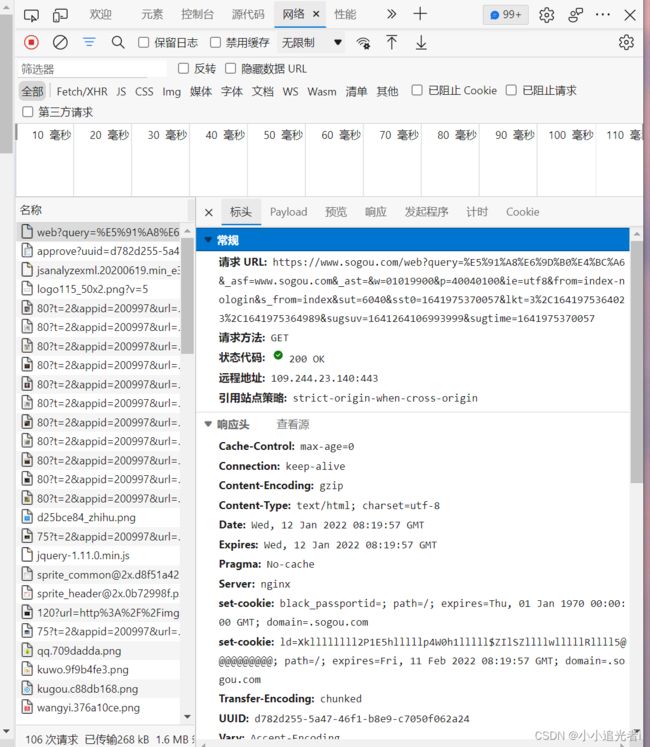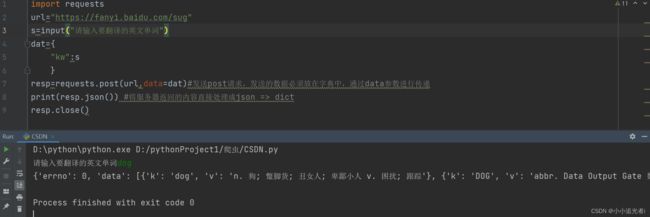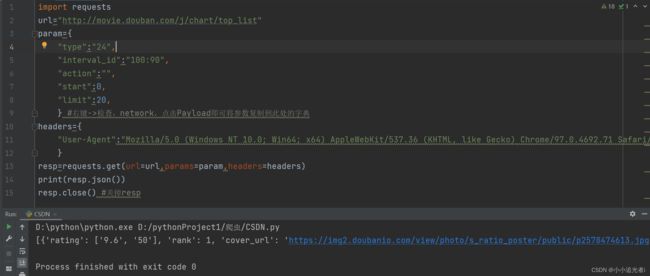- 使用Python构建去中心化预测市场:从概念到实现
Echo_Wish
Python!实战!python去中心化开发语言
使用Python构建去中心化预测市场:从概念到实现大家好,我是Echo_Wish。今天,我们将深入探讨一个前沿的区块链应用——去中心化预测市场,并学习如何使用Python来构建一个简易的预测市场平台。预测市场是基于市场参与者对未来事件的预测来产生结果的地方,通常被用来预测政治事件、金融市场走向、体育比赛结果等。传统的预测市场如Augur、Polymarket等,基于去中心化平台,利用区块链技术确保
- Python自动登陆、登出南京理工大学NJUST校园网程序
JimesMz
python开发语言
本文程序针对南京理工大学NJUST和NJUST-FREE校园网开发,其他学校无法使用。文章目录开发目的使用说明参考资料开发目的今天突然想要用代码实现一下自动登陆校园网,上网搜寻了一下。知乎有一些教程,CSDN也有一些完整的代码,但是我跟随教程或者直接运行现有代码都没有能够成功登陆,且NJUST校园网付费,我想要一个“登出”功能,借助Kimi自己写了一下。本人技术不精,以实现功能为主。使用说明请确保
- Python爬虫笔记一(来自MOOC) Requests库入门
小灰不停前进
#Pythonpythonpycharm爬虫
Python爬虫笔记一通用代码框架:importrequestsdefgetHTMLText(url):try:r=requests.get(url,timeput=30)r.raise_for_status()#如果状态不是200,引发HTTPError异常r.encoding=r.apparemt_encodingreturnr.textexcept:return"产生异常"if__name_
- Python调用fofa API接口并写入csv文件中
YOHO !GIRL
网络测绘python网络安全
前言一.功能目的二.功能调研三.编写代码1.引入库2.读取数据3.写入csv文件中总结前言上一篇我们讲述了目前较为主流的几款网络探测系统,简单介绍了页面的使用方法。链接如下,点击跳转:网络空间测绘引擎集合:Zoomeye、fofa、360、shodan、censys、鹰图然而当我们需要针对单个引擎进行二次开发时,页面就不能满足我们的需求了,这就需要参考API文档进行简单的数据处理,接下来,给大家介
- SenseVoice 部署记录
安静六角
开源软件
最近试用了SenseVoice(阿里团队开源的语音转文字)效果可以,可以本地部署,有webui界面,测试了万字以上的转换效果可以。首先部署好conda环境和cuda,这个可以查看他人的文章。步骤1.创建虚拟环境:condacreate-nmainenvpython=3.102.然后安装依赖condaactivatemainenvpipinstall-rC:\Users\xx\Documents\P
- Python基于深度学习的动物图片识别技术的研究与实现
Java老徐
Python毕业设计python深度学习开发语言深度学习的动物图片识别技术Python动物图片识别技术
博主介绍:✌程序员徐师兄、7年大厂程序员经历。全网粉丝12w+、csdn博客专家、掘金/华为云/阿里云/InfoQ等平台优质作者、专注于Java技术领域和毕业项目实战✌文末获取源码联系精彩专栏推荐订阅不然下次找不到哟2022-2024年最全的计算机软件毕业设计选题大全:1000个热门选题推荐✅Java项目精品实战案例《100套》Java微信小程序项目实战《100套》感兴趣的可以先收藏起来,还有大家
- Python实现微信自动发送消息
热心市民小汪
python微信开发语言
实现需求:Python定时发送微信消息importpyautoguiaspgimportpyperclipaspcfromapscheduler.schedulers.blockingimportBlockingScheduler"""实现定时自动发送消息"""#操作间隔为1秒pg.PAUSE=1name='Hello~'msg='是时候点餐啦!!'defmain():#打开微信pg.hotkey
- 程序代码篇---Pyqt的密码界面
Ronin-Lotus
程序代码篇上位机知识篇pyqt数据库pythonubuntu
文章目录前言一、代码二、代码解释2.1用户数据库定义2.2窗口初始化2.3认证逻辑2.5角色处理2.6错误处理优化2.7功能扩展说明2.7.1用户类型区分管理员普通用户其他用户2.7.2安全增强建议三、运行效果四、运行命令五、界面改进建议5.1密码显示5.2用户头像显示5.3输入框动画效果5.4加载进度显示5.5键盘快捷键前言本文简单介绍了在Ubuntu系统上使用Python的Pyqt创建密码登录
- 深度学习 | pytorch + torchvision + python 版本对应及环境安装
zfgfdgbhs
深度学习pythonpytorch
目录一、版本对应二、安装命令(pip)1.版本(1)v2.5.1~v2.0.0(2)v1.13.1~v1.11.0(3)v1.10.1~v1.7.02.安装全过程(1)选择版本(2)安装结果参考文章一、版本对应下表来自pytorch的github官方文档:pytorch/vision:Datasets,TransformsandModelsspecifictoComputerVisionpytor
- Python读取.nc文件的方法与技术详解
傻啦嘿哟
关于python那些事儿人工智能前端服务器
目录一、引言二、使用netCDF4库读取.nc文件安装netCDF4库导入netCDF4库打开.nc文件获取变量读取变量数据案例与代码三、使用xarray库读取.nc文件安装xarray库导入xarray库打开.nc文件访问变量数据案例与代码四、性能与优化分块读取使用Dask进行并行计算减少不必要的变量加载五、其他注意事项文件路径变量命名数据类型文件关闭六、总结一、引言.nc文件,即NetCDF(
- Python画词云图,Python画圆形词云图,API详解
请一直在路上
python开发语言
在Python中,词云图的常用库是wordcloud。以下是核心API参数的详细讲解,以及一个完整的使用示例。一、参数类型默认值说明参数类型默认值说明widthint400词云图的宽度(像素)heightint200词云图的高度(像素)background_colorstr“black”背景颜色,可以是颜色名称(如“white”)或十六进制值(如“#FFFFFF”)colormapstr/matp
- 23、nc文件快速切片与索引
爱转呼啦圈的小兔子
气象数据处理与可视化python气象气象可视化气候变化
1前言在气象、海洋学和环境科学等领域,.nc(NetCDF)格式文件是存储和共享多维科学数据的常用格式。这些数据文件通常包含大量的经度、纬度、时间和垂直层次数据。在处理这些数据时,研究人员常常需要根据特定的地理和时间范围提取数据,以便进行深入分析。为此,我们开发了一个名为nc_slice的Python函数,用于从一个或多个.nc格式文件中高效地筛选和提取数据。nc_slice函数提供了一种简洁而灵
- 【最新】TensorFlow、cuDNN、CUDA三者之间的最新版本对应及下载地址
江上_酒
开发环境及工具配置TensorFlowCUDAcuDNN
TensorFlow、cuDNN、CUDA对应关系官网查询地址CUDA下载地址cuDNN下载地址VersionPythonversionCompilerBuildtoolscuDNNCUDAtensorflow_gpu-2.9.03.7-3.10MSVC2019Bazel5.0.08.111.2tensorflow_gpu-2.8.03.7-3.10MSVC2019Bazel4.2.18.111.
- Python读取nc文件的几种方式
请一直在路上
python
在Python中,有多种方式可以读取NetCDF(.nc)文件。常见的方法包括使用以下库:1.netCDF4这是最常用的库之一,提供了直接读取、写入和处理NetCDF文件的功能。它支持版本3和版本4的NetCDF文件格式。安装:pipinstallnetCDF4用法:importnetCDF4asnc#打开文件dataset=nc.Dataset('example.nc')#查看文件的维度prin
- UV - Python 包管理
丽英y
Pythonuvpython开发语言
文章目录创建uv项目已有项目已有uv项目创建uv项目#创建项目uvinitm3#创建环境cdm3uvvenv--python3.11#激活环境source.venv/bin/activate#添加库uvaddflask如果创建项目后,给库取别的名字,add的时候,会自动创建.venv文件夹>uvvenv--python3.12e312[0]UsingCPython3.12.8interpreter
- 漫谈JVM
weixin_34111790
运维javapython
2019独角兽企业重金招聘Python工程师标准>>>背景介绍创建了一个技术类公众号:一起源码分析,里面会分享最新的开源代码、源码解读、开发技巧等,欢迎大家关注。JVM已经是Java开发的必备技能了,JVM相当于Java的操作系统。JVM,javavirtualmachine,即Java虚拟机,是运行javaclass文件的程序。Java代码经过Java编译器编译,会编译成class文件,一种平台
- 开发语言漫谈-脚本语言
大道不孤,众行致远
技术杂谈开发语言
前面讲的都称之为编程语言,就是做系统用的。还有一大类称之为脚本语言的语言,这类语言数量极多,大部分程序员用不上,也不关心,这是系统维护人员专用的邻域。这个定义其实也很不准确,不必较真。更准确的来讲,能直接运行的文本都可以称之为脚本语言,按这个标准,python也是。但是python同样用于做系统。我们今天讲的脚本语言纯粹用于系统维护邻域。我们重点将编程语言,对这些脚本语言就打包一起介绍了bash:
- Python环境管理新利器:UV工具详解
云水木石
pythonuv开发语言
Python包和环境管理最好的工具无疑是Anaconda,但我在之前的一篇文章《注意,使用这款Python软件可能会带来麻烦》写过,个人使用完全没有问题。如果在公司内使用,就需要格外小心,可能会招来官司。在我们公司,Anaconda(包括Miniconda)就是禁止安装的软件之一。但是在工作中,确实又存在需要切换不同Python版本的需求,比如编译Chromium需要Python3.8以上的版本,
- Python新手入门 python流程控制基础1——条件语句if~~else;if~elif~else;
不爱纸片人
python
提示:文章写完后,目录可以自动生成,如何生成可参考右边的帮助文档文章目录一、条件语句是什么?二、语句使用方法1.if.....2.if.......elif......3.if.......elif......else.......总结一、条件语句是什么?在Python中,条件语句用于根据不同的条件执行不同的代码块二、语句使用方法一共有三种if…if’…elif…if…elif…else…1.if
- 使用 NetworkX 进行图论分析与可视化
aiweker
跟我学python图论python
使用NetworkX进行图论分析与可视化NetworkX是一个用于创建、操作和研究复杂网络的Python库。它提供了丰富的图论算法和数据结构,适用于各种网络分析任务。本文将分点介绍NetworkX的主要功能,并通过代码示例进行详细说明。1.安装NetworkX在开始使用NetworkX之前,首先需要安装它。可以通过pip进行安装:pipinstallnetworkx2.创建图NetworkX支持多
- 使用 UV 管理 Python 项目 | python小知识
aiweker
跟我学pythonuvpython人工智能
使用UV管理Python项目|python小知识1.引言在Python开发中,项目管理工具是必不可少的。常见的工具如pip、pipenv、poetry等,它们各有优缺点。近年来,uv作为一个新兴的Python项目管理工具,逐渐受到开发者的关注。uv旨在提供更快的依赖解析和安装速度,同时保持与现有工具的兼容性。本文将详细介绍uv的功能和应用场景,并通过代码示例展示其使用方法。最后,我们将对比uv与其
- Python 常用内建模块-HTMLParser
赔罪
Python系统学习python开发语言
目录HTMLParser小结练习HTMLParser如果我们要编写一个搜索引擎,第一步是用爬虫把目标网站的页面抓下来,第二步就是解析该HTML页面,看看里面的内容到底是新闻、图片还是视频。假设第一步已经完成了,第二步应该如何解析HTML呢?HTML本质上是XML的子集,但是HTML的语法没有XML那么严格,所以不能用标准的DOM或SAX来解析HTML。好在Python提供了HTMLParser来非
- Python 常用内建模块-venv
赔罪
Python系统学习python开发语言
目录venv小结venv在开发Python应用程序的时候,系统安装的Python3只有一个版本:3.x。所有第三方的包都会被pip安装到Python3的site-packages目录下。如果我们要同时开发多个应用程序,那这些应用程序都会共用一个Python,就是安装在系统的Python3。如果应用A需要jinja2.7,而应用B需要jinja2.6怎么办?这种情况下,每个应用可能需要各自拥有一套“
- python Qt
Solkatt's
最近帮朋友做了一个将文本文件按条件导出到excel里面的小程序。使用了PyQT,发现Python真是一门强大的脚本语言,开发效率极高。首先需要引用fromPyQt4importQtGui,uic,QtCore很多控件像QPushButton是从QtGui的空间中得来的,下面def__init__(self,parent=None)中定义了界面的设计及与控件相互联系的方法。classAddressB
- pyspark学习rdd处理数据方法——学习记录
亭午
学习
python黑马程序员"""文件,按JSON字符串存储1.城市按销售额排名2.全部城市有哪些商品类别在售卖3.上海市有哪些商品类别在售卖"""frompysparkimportSparkConf,SparkContextimportosimportjsonos.environ['PYSPARK_PYTHON']=r"D:\anaconda\envs\py10\python.exe"#创建Spark
- 实时光线追踪技术:Ray Tracing_2024-07-21_02-55-16.Tex
chenjj4003
游戏开发python算法人工智能矩阵线性代数骨骼绑定开发语言
实时光线追踪技术:RayTracing实时光线追踪技术教程基础知识光线追踪原理光线追踪是一种渲染技术,它通过模拟光线在场景中的传播和反射来生成图像。在实时光线追踪中,这一过程被优化以在有限的时间内完成,通常用于游戏和实时动画。其核心原理是逆向追踪,即从观察者(摄像机)发出光线,而不是从光源发出,这样可以减少计算量。示例:光线追踪的基本算法#Python示例代码,展示如何计算光线与场景中物体的交点c
- PyQt和PySide的区别和比较
PgosOcaml
pyqtmfcc++
PyQt和PySide的区别和比较PyQt和PySide是两个用于创建图形用户界面(GUI)的Python库。它们都是基于Qt框架,Qt是一个跨平台的应用程序和UI开发框架。本文将介绍PyQt和PySide之间的区别和比较,并提供相应的源代码示例。开发者许可证:PyQt的开发者许可证是商业许可证,因此如果您想在商业项目中业项目中使用PyQt,您需要购买相应的许可证。而Py业项目中使用PyQt,您需
- Python 错误处理
赔罪
Python系统学习python开发语言
目录try调用栈记录错误抛出错误练习小结在程序运行的过程中,如果发生了错误,可以事先约定返回一个错误代码,这样,就可以知道是否有错,以及出错的原因。在操作系统提供的调用中,返回错误码非常常见。比如打开文件的函数open(),成功时返回文件描述符(就是一个整数),出错时返回-1。用错误码来表示是否出错十分不便,因为函数本身应该返回的正常结果和错误码混在一起,造成调用者必须用大量的代码来判断是否出错:
- 【Python Qt 基本概念】深入探讨 PySide6 与 PyQt6:选择、共存与最佳实践
泡沫o0
Qt应用开发-探索Qt的魅力与实践Python基础教程mfcc++qt开发语言python嵌入式linux
目录标题第一章:Python绑定的Qt库——PySide6与PyQt6的比较1.1PySide6与PyQt6的基本介绍1.1.1PySide6:Qt官方推荐的Python绑定1.1.2PyQt6:成熟的第三方Python绑定1.1.3主要差异:许可证1.2两者的相似性与差异性1.2.1功能和性能差异1.2.2API差异与兼容性1.3总结:选择的自由与责任第二章:在VSCode中使用PySide6与
- 《AI大模型趣味实战 》第8集:多端适配 个人新闻头条 基于大模型和RSS聚合打造个人新闻电台(Flask WEB版) 2
带娃的IT创业者
AI大模型趣味实战人工智能flask前端
《AI大模型趣味实战》第8集:多端适配个人新闻头条基于大模型和RSS聚合打造个人新闻电台(FlaskWEB版)2摘要本文末尾介绍了如何实现新闻智能体的方法。在信息爆炸的时代,如何高效获取和筛选感兴趣的新闻内容成为一个现实问题。本文将带领读者通过Python和Flask框架,结合大模型的强大能力,构建一个个性化的新闻聚合平台,不仅能够自动收集整理各类RSS源的新闻,还能以语音播报的形式提供"新闻电台
- sql统计相同项个数并按名次显示
朱辉辉33
javaoracle
现在有如下这样一个表:
A表
ID Name time
------------------------------
0001 aaa 2006-11-18
0002 ccc 2006-11-18
0003 eee 2006-11-18
0004 aaa 2006-11-18
0005 eee 2006-11-18
0004 aaa 2006-11-18
0002 ccc 20
- Android+Jquery Mobile学习系列-目录
白糖_
JQuery Mobile
最近在研究学习基于Android的移动应用开发,准备给家里人做一个应用程序用用。向公司手机移动团队咨询了下,觉得使用Android的WebView上手最快,因为WebView等于是一个内置浏览器,可以基于html页面开发,不用去学习Android自带的七七八八的控件。然后加上Jquery mobile的样式渲染和事件等,就能非常方便的做动态应用了。
从现在起,往后一段时间,我打算
- 如何给线程池命名
daysinsun
线程池
在系统运行后,在线程快照里总是看到线程池的名字为pool-xx,这样导致很不好定位,怎么给线程池一个有意义的名字呢。参照ThreadPoolExecutor类的ThreadFactory,自己实现ThreadFactory接口,重写newThread方法即可。参考代码如下:
public class Named
- IE 中"HTML Parsing Error:Unable to modify the parent container element before the
周凡杨
html解析errorreadyState
错误: IE 中"HTML Parsing Error:Unable to modify the parent container element before the child element is closed"
现象: 同事之间几个IE 测试情况下,有的报这个错,有的不报。经查询资料后,可归纳以下原因。
- java上传
g21121
java
我们在做web项目中通常会遇到上传文件的情况,用struts等框架的会直接用的自带的标签和组件,今天说的是利用servlet来完成上传。
我们这里利用到commons-fileupload组件,相关jar包可以取apache官网下载:http://commons.apache.org/
下面是servlet的代码:
//定义一个磁盘文件工厂
DiskFileItemFactory fact
- SpringMVC配置学习
510888780
springmvc
spring MVC配置详解
现在主流的Web MVC框架除了Struts这个主力 外,其次就是Spring MVC了,因此这也是作为一名程序员需要掌握的主流框架,框架选择多了,应对多变的需求和业务时,可实行的方案自然就多了。不过要想灵活运用Spring MVC来应对大多数的Web开发,就必须要掌握它的配置及原理。
一、Spring MVC环境搭建:(Spring 2.5.6 + Hi
- spring mvc-jfreeChart 柱图(1)
布衣凌宇
jfreechart
第一步:下载jfreeChart包,注意是jfreeChart文件lib目录下的,jcommon-1.0.23.jar和jfreechart-1.0.19.jar两个包即可;
第二步:配置web.xml;
web.xml代码如下
<servlet>
<servlet-name>jfreechart</servlet-nam
- 我的spring学习笔记13-容器扩展点之PropertyPlaceholderConfigurer
aijuans
Spring3
PropertyPlaceholderConfigurer是个bean工厂后置处理器的实现,也就是BeanFactoryPostProcessor接口的一个实现。关于BeanFactoryPostProcessor和BeanPostProcessor类似。我会在其他地方介绍。PropertyPlaceholderConfigurer可以将上下文(配置文件)中的属性值放在另一个单独的标准java P
- java 线程池使用 Runnable&Callable&Future
antlove
javathreadRunnablecallablefuture
1. 创建线程池
ExecutorService executorService = Executors.newCachedThreadPool();
2. 执行一次线程,调用Runnable接口实现
Future<?> future = executorService.submit(new DefaultRunnable());
System.out.prin
- XML语法元素结构的总结
百合不是茶
xml树结构
1.XML介绍1969年 gml (主要目的是要在不同的机器进行通信的数据规范)1985年 sgml standard generralized markup language1993年 html(www网)1998年 xml extensible markup language
- 改变eclipse编码格式
bijian1013
eclipse编码格式
1.改变整个工作空间的编码格式
改变整个工作空间的编码格式,这样以后新建的文件也是新设置的编码格式。
Eclipse->window->preferences->General->workspace-
- javascript中return的设计缺陷
bijian1013
JavaScriptAngularJS
代码1:
<script>
var gisService = (function(window)
{
return
{
name:function ()
{
alert(1);
}
};
})(this);
gisService.name();
&l
- 【持久化框架MyBatis3八】Spring集成MyBatis3
bit1129
Mybatis3
pom.xml配置
Maven的pom中主要包括:
MyBatis
MyBatis-Spring
Spring
MySQL-Connector-Java
Druid
applicationContext.xml配置
<?xml version="1.0" encoding="UTF-8"?>
&
- java web项目启动时自动加载自定义properties文件
bitray
javaWeb监听器相对路径
创建一个类
public class ContextInitListener implements ServletContextListener
使得该类成为一个监听器。用于监听整个容器生命周期的,主要是初始化和销毁的。
类创建后要在web.xml配置文件中增加一个简单的监听器配置,即刚才我们定义的类。
<listener>
<des
- 用nginx区分文件大小做出不同响应
ronin47
昨晚和前21v的同事聊天,说到我离职后一些技术上的更新。其中有个给某大客户(游戏下载类)的特殊需求设计,因为文件大小差距很大——估计是大版本和补丁的区别——又走的是同一个域名,而squid在响应比较大的文件时,尤其是初次下载的时候,性能比较差,所以拆成两组服务器,squid服务于较小的文件,通过pull方式从peer层获取,nginx服务于较大的文件,通过push方式由peer层分发同步。外部发布
- java-67-扑克牌的顺子.从扑克牌中随机抽5张牌,判断是不是一个顺子,即这5张牌是不是连续的.2-10为数字本身,A为1,J为11,Q为12,K为13,而大
bylijinnan
java
package com.ljn.base;
import java.util.Arrays;
import java.util.Random;
public class ContinuousPoker {
/**
* Q67 扑克牌的顺子 从扑克牌中随机抽5张牌,判断是不是一个顺子,即这5张牌是不是连续的。
* 2-10为数字本身,A为1,J为1
- 翟鸿燊老师语录
ccii
翟鸿燊
一、国学应用智慧TAT之亮剑精神A
1. 角色就是人格
就像你一回家的时候,你一进屋里面,你已经是儿子,是姑娘啦,给老爸老妈倒怀水吧,你还觉得你是老总呢?还拿派呢?就像今天一样,你们往这儿一坐,你们之间是什么,同学,是朋友。
还有下属最忌讳的就是领导向他询问情况的时候,什么我不知道,我不清楚,该你知道的你凭什么不知道
- [光速与宇宙]进行光速飞行的一些问题
comsci
问题
在人类整体进入宇宙时代,即将开展深空宇宙探索之前,我有几个猜想想告诉大家
仅仅是猜想。。。未经官方证实
1:要在宇宙中进行光速飞行,必须首先获得宇宙中的航行通行证,而这个航行通行证并不是我们平常认为的那种带钢印的证书,是什么呢? 下面我来告诉
- oracle undo解析
cwqcwqmax9
oracle
oracle undo解析2012-09-24 09:02:01 我来说两句 作者:虫师收藏 我要投稿
Undo是干嘛用的? &nb
- java中各种集合的详细介绍
dashuaifu
java集合
一,java中各种集合的关系图 Collection 接口的接口 对象的集合 ├ List 子接口 &n
- 卸载windows服务的方法
dcj3sjt126com
windowsservice
卸载Windows服务的方法
在Windows中,有一类程序称为服务,在操作系统内核加载完成后就开始加载。这里程序往往运行在操作系统的底层,因此资源占用比较大、执行效率比较高,比较有代表性的就是杀毒软件。但是一旦因为特殊原因不能正确卸载这些程序了,其加载在Windows内的服务就不容易删除了。即便是删除注册表中的相 应项目,虽然不启动了,但是系统中仍然存在此项服务,只是没有加载而已。如果安装其他
- Warning: The Copy Bundle Resources build phase contains this target's Info.plist
dcj3sjt126com
iosxcode
http://developer.apple.com/iphone/library/qa/qa2009/qa1649.html
Excerpt:
You are getting this warning because you probably added your Info.plist file to your Copy Bundle
- 2014之C++学习笔记(一)
Etwo
C++EtwoEtwoiterator迭代器
已经有很长一段时间没有写博客了,可能大家已经淡忘了Etwo这个人的存在,这一年多以来,本人从事了AS的相关开发工作,但最近一段时间,AS在天朝的没落,相信有很多码农也都清楚,现在的页游基本上达到饱和,手机上的游戏基本被unity3D与cocos占据,AS基本没有容身之处。so。。。最近我并不打算直接转型
- js跨越获取数据问题记录
haifengwuch
jsonpjsonAjax
js的跨越问题,普通的ajax无法获取服务器返回的值。
第一种解决方案,通过getson,后台配合方式,实现。
Java后台代码:
protected void doPost(HttpServletRequest req, HttpServletResponse resp)
throws ServletException, IOException {
String ca
- 蓝色jQuery导航条
ini
JavaScripthtmljqueryWebhtml5
效果体验:http://keleyi.com/keleyi/phtml/jqtexiao/39.htmHTML文件代码:
<!DOCTYPE html>
<html xmlns="http://www.w3.org/1999/xhtml">
<head>
<title>jQuery鼠标悬停上下滑动导航条 - 柯乐义<
- linux部署jdk,tomcat,mysql
kerryg
jdktomcatlinuxmysql
1、安装java环境jdk:
一般系统都会默认自带的JDK,但是不太好用,都会卸载了,然后重新安装。
1.1)、卸载:
(rpm -qa :查询已经安装哪些软件包;
rmp -q 软件包:查询指定包是否已
- DOMContentLoaded VS onload VS onreadystatechange
mutongwu
jqueryjs
1. DOMContentLoaded 在页面html、script、style加载完毕即可触发,无需等待所有资源(image/iframe)加载完毕。(IE9+)
2. onload是最早支持的事件,要求所有资源加载完毕触发。
3. onreadystatechange 开始在IE引入,后来其它浏览器也有一定的实现。涉及以下 document , applet, embed, fra
- sql批量插入数据
qifeifei
批量插入
hi,
自己在做工程的时候,遇到批量插入数据的数据修复场景。我的思路是在插入前准备一个临时表,临时表的整理就看当时的选择条件了,临时表就是要插入的数据集,最后再批量插入到数据库中。
WITH tempT AS (
SELECT
item_id AS combo_id,
item_id,
now() AS create_date
FROM
a
- log4j打印日志文件 如何实现相对路径到 项目工程下
thinkfreer
Weblog4j应用服务器日志
最近为了实现统计一个网站的访问量,记录用户的登录信息,以方便站长实时了解自己网站的访问情况,选择了Apache 的log4j,但是在选择相对路径那块 卡主了,X度了好多方法(其实大多都是一样的内用,还一个字都不差的),都没有能解决问题,无奈搞了2天终于解决了,与大家分享一下
需求:
用户登录该网站时,把用户的登录名,ip,时间。统计到一个txt文档里,以方便其他系统调用此txt。项目名
- linux下mysql-5.6.23.tar.gz安装与配置
笑我痴狂
mysqllinuxunix
1.卸载系统默认的mysql
[root@localhost ~]# rpm -qa | grep mysql
mysql-libs-5.1.66-2.el6_3.x86_64
mysql-devel-5.1.66-2.el6_3.x86_64
mysql-5.1.66-2.el6_3.x86_64
[root@localhost ~]# rpm -e mysql-libs-5.1



